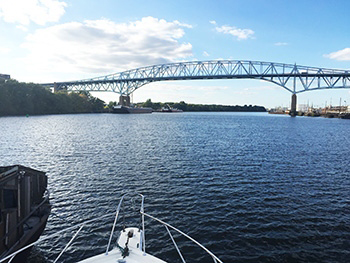Collaborating on Program to Offer Tours of Lower Schuylkill River

Inspired by urban river projects that have revitalized the cities of Los Angeles and New York, the Penn Program in the Environmental Humanities (PPEH) is collaborating on a project with Bartram’s Garden and River Corps to increase access to the Lower Schuylkill River, helping more people connect to the storied waterway.
The PPEH is exploring the development of “multi-modal public river-based tours” of Southwest Philadelphia, with Bartram’s Garden serving as the central hub of activities.
The PPEH will host a public planning meeting on Thursday, April 14, from 10 a.m. to noon at Bartram’s Garden. Discussion will center on existing local organizations, programs and events that intersect with the river guides project, examples of successful urban waterway tours and content for Lower Schuylkill River Guide tours.
Reservations are encouraged and can be made by emailing Bethany Wiggin, an associate professor of German in the School of Arts & Sciences and PPEH director, at director@ppehlab.org
“We’ve been working and collaborating on the river all year long,” Dr. Wiggin says. “The experience of getting on the water—whether in Bartram’s public kayaks or in our public Lab at WetLand—has been absolutely central.”
The project seeks to supplement a number of ongoing riverfront programs and projects underway at Bartram’s Garden. They include the PPEH Lab at WetLand, a public art project for “experiments in sustainability” based in a houseboat on the river. Participants at the planning meeting will have an opportunity to explore WetLand, http://www.ppehlab.org/wetland/
Additional meetings are planned leading up to a one-day certification session for river guides during the week of August 22.
As envisioned, the first phase of the project will culminate in river and watershed tours led by the corps of certified river guides in kayaks, bicycles and/or on foot. In phase two, a website will be created with information about the Schuylkill River, its past and future. The third phase will involve development of a mobile app to enable visitors to explore the river on their own through self-guided tours.
Public access to the riverbanks has risen dramatically in recent years as efforts by the Schuylkill River Trail Council to connect the trail’s sections have flourished. Dr. Wiggin envisions the new tours evolving to build audiences that will grow over time, as well.
She says that floating on the river that provides Philadelphia’s single largest source of drinking water, between the nation’s oldest botanic garden on the west bank and one of its oldest refineries on the east, is amazing.
“It’s quite a contrast,” she says, “and an important vantage point to facilitate dialogue about our community’s experiences of environmental degradation and, vitally, of resilience.”
